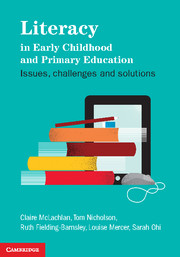Book contents
- Frontmatter
- Contents
- List of figures
- List of tables
- About the authors
- Acknowledgements
- Chapter 1 Introduction
- Part 1 Literacy acquisition: the child, the family and diversity in the modern world
- Part 2 Learning about literacy in early childhood settings
- Part 3 Literacy learning in the primary school
- Part 4 Literacy learning in the senior primary school
- Chapter 14 Extending reading and writing in the senior primary school: focus on factual writing
- Chapter 15 Struggling readers: issues and solutions
- Chapter 16 Conclusion
- References
- Index
Chapter 16 - Conclusion
from Part 4 - Literacy learning in the senior primary school
- Frontmatter
- Contents
- List of figures
- List of tables
- About the authors
- Acknowledgements
- Chapter 1 Introduction
- Part 1 Literacy acquisition: the child, the family and diversity in the modern world
- Part 2 Learning about literacy in early childhood settings
- Part 3 Literacy learning in the primary school
- Part 4 Literacy learning in the senior primary school
- Chapter 14 Extending reading and writing in the senior primary school: focus on factual writing
- Chapter 15 Struggling readers: issues and solutions
- Chapter 16 Conclusion
- References
- Index
Summary
Chapter objectives
To examine key principles for supporting children from emergent literacy to fluent reading and writing, using possible solutions to scenarios.
To review the notion of literacy for life and how parents, families, schools and communities all contribute to children’s literacy acquisition.
To consider how teachers of the future can avoid the pitfalls of education of the past and provide greater equity of opportunity for the learners of the future.
This final chapter draws together the key findings of each chapter and provides an overall summary of the principles for supporting children to make the transition from emergent literacy to fluent reading and writing. This chapter stresses the notion of literacy for life and reiterates the need for readers to be lifelong readers and what a difference that makes to what and how children learn and with whom.
What is different about this book?
The first thing to say is that the book covers a wide range of ages, from early childhood through to the end of primary school, and covers both reading and writing, as well as diverse classrooms, assessment, and literacy difi culties. Many texts on literacy focus on either early childhood or primary education and do not include our strong focus on continuity of literacy learning and the importance of strong transitions between homes and early childhood or primary school settings. We have argued that literacy is determined by biology, development, opportunities, and social and cultural contexts. As we explained in our introduction, we have based our definitions of what constitutes literacy on explanations stemming from neuroscience, from sociocultural theory and from social practice definitions of literacy (Berninger & Richards 2002 ; NELP 2009 ; Stahl & Yaden 2004 ; Teale et al. 2009 ; Vygotsky 1978).
- Type
- Chapter
- Information
- Literacy in Early Childhood and Primary EducationIssues, Challenges, Solutions, pp. 292 - 302Publisher: Cambridge University PressPrint publication year: 2012



